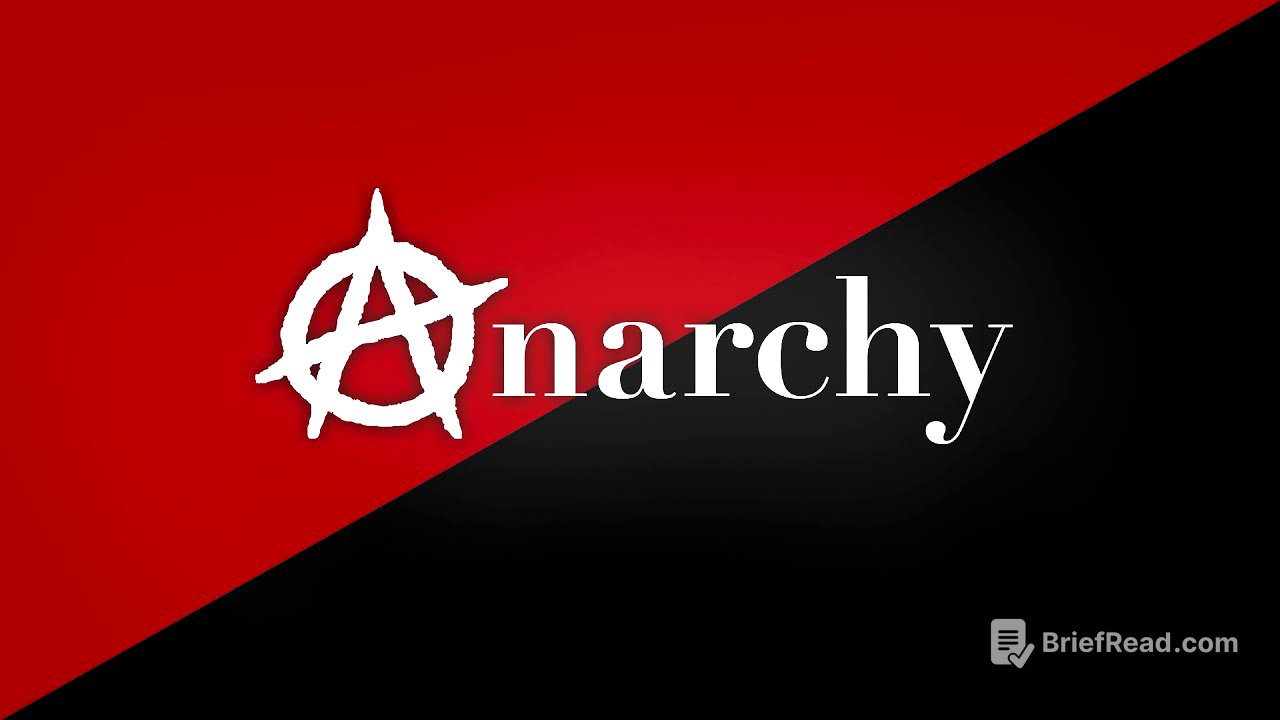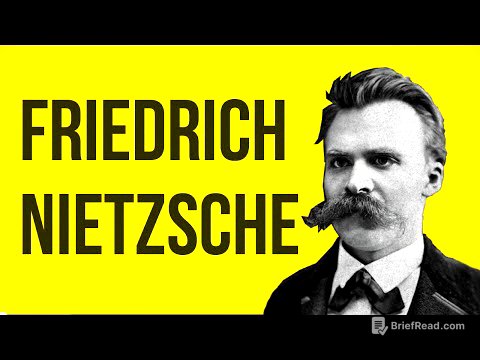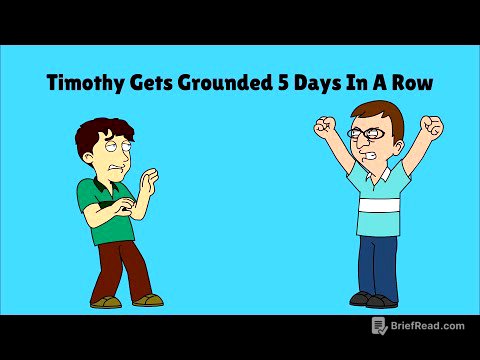TLDR;
This video summarizes Errico Malatesta's 1892 pamphlet "Anarchy," chapter by chapter, to clarify the philosophy and correct common misconceptions. It defines anarchism as a society without government, based on freedom, solidarity, and voluntary cooperation. The video challenges the necessity of government, arguing it serves the interests of a privileged minority and hinders social progress. It emphasizes mutual aid and cooperation as fundamental human characteristics, advocating for the abolition of private property and the state to achieve a truly free and equal society.
- Anarchism defined as "without government," aiming for natural order and complete freedom within solidarity.
- Government is seen as a tool of domination, protecting the interests of a wealthy minority.
- Mutual aid and cooperation are presented as natural human instincts, essential for social progress.
- Abolition of private property and government is advocated to foster a society of free and equal members.
Introduction [0:00]
The video introduces anarchism through Errico Malatesta's 1892 pamphlet "Anarchy," aiming to clarify the philosophy and correct common misconceptions. The presenter acknowledges personal biases as an anarchist and intends to provide a clear understanding of anarchism, even for those who disagree with its principles. The video will summarize Malatesta's text chapter by chapter, encouraging viewers to read along.
Chapter 1 [2:04]
Chapter 1 starts by exploring the etymology of "anarchy," meaning "without government" in Greek, contrasting this with its common negative connotation of chaos. Malatesta attributes this negative perception to the prejudiced belief that government is essential for societal function, a belief rooted in habit rather than reason. He uses analogies like descendants of slaves believing in the necessity of slavery and a person with bound legs thinking the bonds enable them to walk to illustrate how ingrained but unjustified beliefs can be. He defines the State as the collection of institutions that remove control and responsibility from the people, entrusting them to a select few. The abolition of the State means destroying political order based on authority and creating a society of free, equal members with voluntary participation in social responsibilities.
Chapter 2 [6:48]
Chapter 2 questions the nature and desirability of government. It challenges the common perception of government as an abstract, benevolent entity representing the will of the people. Instead, anarchists view government as composed of individuals—governors—who wield power to regulate society through laws, taxes, and military force. Malatesta questions why such power should be given to a few, asking if they possess exceptional abilities or are immune to corruption. He argues that no one is so gifted as to replace the collective wisdom of the people or to handle such immense responsibility without being corrupted by it. Even if governors were infinitely wise and good, their concentration of power would be pointless and potentially hinder societal development. The chapter also critiques the fairness of suffrage, noting that numbers don't guarantee reason or ability, and expresses concern for the representation of minorities.
Chapter 3 [13:01]
Chapter 3 examines the justifications for government, arguing they stem from the prejudiced view that society consists of individuals with conflicting interests, necessitating a higher authority to mediate. Malatesta refutes this, stating that governments historically serve as tools of domination, benefiting a minority (kings, aristocrats) through oppression and economic exploitation. He identifies two forms of oppression: direct physical violence and indirect control through private property, which deprives people of the means to life. He critiques private property as a tool of domination, citing Proudhon and Rousseau, because it allows a few to control essential resources, forcing others into servitude. Malatesta traces the evolution of oppression from small societies with combined political and economic power to modern democracies where capitalists control governments to protect their interests. He dismisses modern democracies as not truly democratic, as they serve the bourgeoisie's interests. The chapter concludes by asserting that government is not a mediator but an instrument of domination, protecting the privileges of a powerful minority and corrupting justice and education.
Chapter 4 [29:24]
Chapter 4 expands on the concept of solidarity, quoting Bakunin's idea that "My freedom is the freedom of all." It explains that individuals are interconnected and influenced by each other, so the freedom of one depends on the freedom of all. Cooperation can be perverted when people are forced to work for the profit of a few, highlighting a contradiction in humankind. Malatesta sees the tendency to divide and dominate as animalistic and contrary to human instincts, arguing that the fight against nature must be collective. Despite historical oppression and artificially created conflicts, the social instinct has survived and developed. Travel, communication, science, and production have linked humanity more than ever, making individual well-being dependent on circumstances affecting all human beings. This vast solidarity is mostly unconscious, showing that it is a human instinct. The chapter concludes by stating that this principle should lead to the abolition of private property and government, fostering free, voluntary cooperation directed toward everyone's interests.
Chapter 5 [36:15]
Chapter 5 addresses objections to anarchism, particularly from authoritarian socialists who believe government can change its nature once private property is abolished. Malatesta argues that government inherently seeks to dominate, comparing it to an organ that will either reestablish its function or die. Even in a classless society, the government itself would become a privileged class, protecting its power and privileges. He warns that democracy could devolve into an oppressive oligarchy controlling all social wealth and public services. The chapter also raises questions about who would distribute food, provide healthcare and education, organize large-scale projects, and prevent crime in an anarchist society, setting the stage for further discussion.
Chapter 6 [41:07]
Chapter 6 explores the purpose of government if it weren't a dominant class, questioning how it would strengthen solidarity. Malatesta uses the image of the bound man to illustrate how government monopolizes the instruments of solidarity, hindering individual initiative. He argues that social progress originates from individual thoughts and actions, not government intervention. Liberty means preventing oppression, giving everyone equal rights and means of action, and destroying domination. Even if the government wasn't a privileged class, it would reduce society's potential by only considering the forces from the governors. Malatesta quotes Jean de Sismondi, stating that the State is always a conservative power that legalizes progress but never introduces it. He argues that most social activities don't come from the government, and when it intervenes, it often complicates matters. He also addresses how society would defend itself without a police force or justice system, stating that in a society without private property, the reasons for immoral behavior would disappear.
Chapter 7 [53:37]
Chapter 7 addresses practical questions about how an anarchist society would function, such as education, production, and resource allocation. Malatesta argues that anarchists cannot provide definitive answers, as doing so would contradict the principles of anarchism. He emphasizes that anarchism is not an end goal but a method for achieving the best possible society through solidarity and freedom. He contrasts this with authoritarianism and liberalism, which lead to oppression and competition, respectively. The anarchist method involves abolishing property and relying on communal decision-making to organize society. Malatesta empowers individuals to find solutions through trial and error, academic counsel, and considering the needs of everyone.
Chapter 8 & 9 [59:04]
Chapters 8 and 9 address the argument that humans, raised in a competitive environment, may be unable to cooperate in an anarchist society. Malatesta acknowledges the challenges posed by a world divided into oppressors and oppressed but argues that the state cannot wither away. He believes that the forces of society, without government monopolization, can organize an anarchist revolution. Abolishing the government won't stop people from cooperating out of necessity. Malatesta gives examples of how people would still organize without a government, such as teachers continuing to teach. He argues that a revolutionary government risks becoming as oppressive as the capitalists they overthrow and that governing yourself is the best way to learn how to do it. Malatesta concludes that the solution to society's problems is revolution, involving the appropriation of social wealth, trading competition for cooperation, and resolving challenges in an anarchist way.









